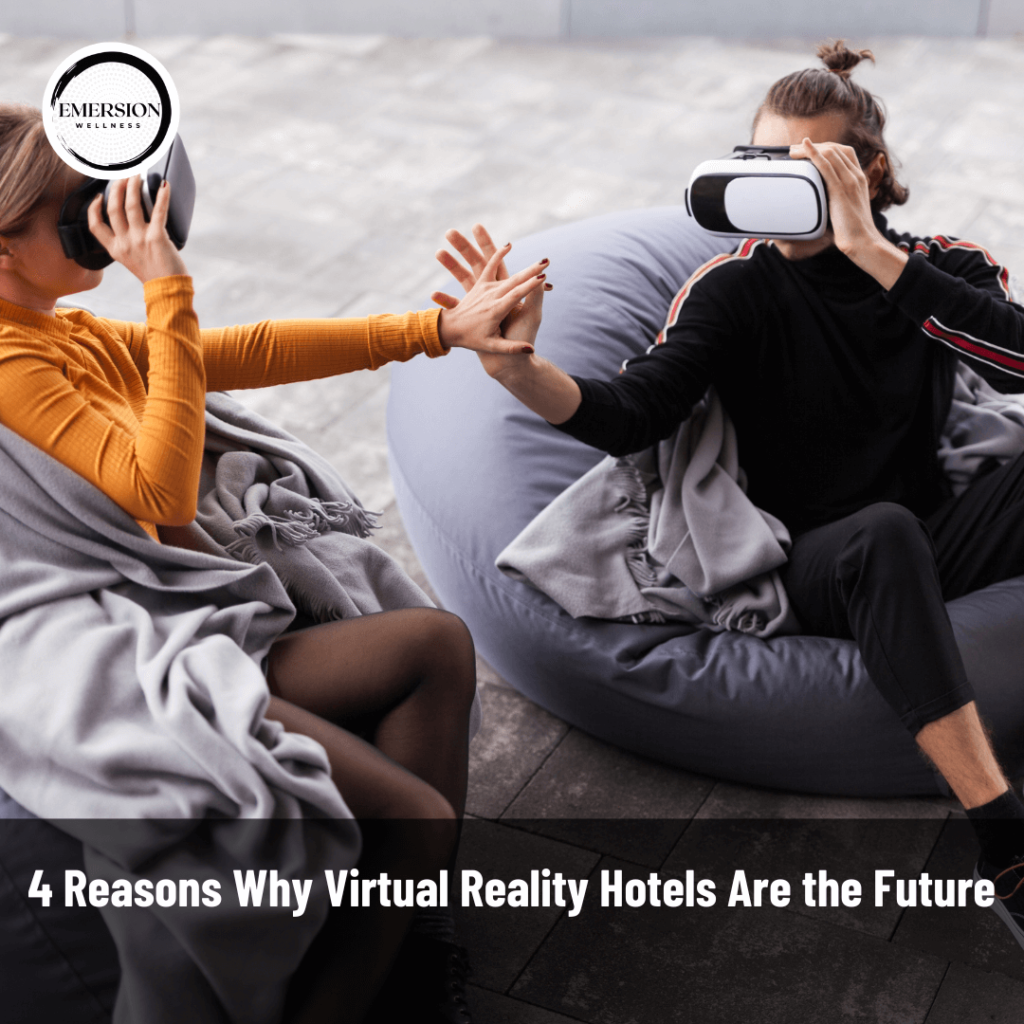The hospitality industry is constantly evolving, and with the rise of new technologies, hotels are looking for innovative ways to attract guests and boost revenue. One such technology with the potential to revolutionize the industry is virtual reality hotels (VR). VR hotels offer guests a unique and immersive experience that can set your establishment apart from the competition.
Critical Takeaways:
- VR hotels allow guests to experience a destination or room virtually before booking.
- VR experiences can enhance the guest experience during their stay.
- VR can be a valuable tool for generating additional revenue streams for hotels.
- Implementing VR technology requires careful planning and consideration.
In this article, we'll explore the exciting world of VR hotels, discussing the key benefits, how to implement VR experiences, and some real-life examples.
The Rise of VR and its Potential Impact on the Hotel Industry
Virtual reality has gone from a futuristic concept to a mainstream technology with a wide range of applications. This growing interest presents a significant opportunity for hotels to leverage VR technology to enhance their offerings and attract new guests.
Virtual Reality
Imagine a potential guest sitting on their couch, wearing a VR headset, and instantly being transported to the crystal-clear waters of the Maldives or the bustling streets of Tokyo. VR allows hotels to showcase their destinations and amenities in a way that traditional photos and videos simply can't. Guests can virtually explore their room options, experience hotel facilities like pools and restaurants, and even get a glimpse of the surrounding area. This immersive experience can help guests make a more informed decision about their stay and create a sense of excitement and anticipation before they even arrive.
For example, the Marriott International chain has partnered with VR company VRdirect to offer guests virtual tours of some of their most popular properties. This allows potential guests to experience the ambiance and amenities of a hotel before booking, leading to a higher conversion rate.
Enhancing the In-Hotel Experience
The benefits of VR hotels go beyond the booking stage. VR can be used to enhance the guest experience during their stay. Imagine a guest arriving at a hotel on a rainy day. Instead of being confined to their room, they could put on a VR headset and virtually explore the city, visit museums, or even go on a virtual hike. VR can also be used for in-room entertainment, offering guests access to a library of VR games, movies, and experiences.
How VR Hotels Can Generate Additional Income?
In addition to enhancing the guest experience, VR hotels can also be a valuable tool for generating additional revenue streams. Hotels can charge guests a rental fee for VR headsets or offer VR experiences as part of a premium package. Additionally, VR technology can be used to create interactive advertising experiences within the VR environment, allowing hotels to partner with local businesses and generate revenue through targeted advertising.
A Lucrative Opportunity Awaits
The rise of VR fitness is another exciting development with implications for VR hotels. Imagine guests attending a virtual spin class or participating in a VR boxing session, all from the comfort of their hotel room. VR fitness experiences can be offered as an add-on service, generating additional revenue for the hotel. This can be particularly attractive to guests who are looking to maintain their fitness routine while traveling.
A Unique Selling Point
VR can also be used to create unique and immersive events within the hotel. Imagine guests attending a virtual concert or a live cooking class, all without leaving the property. These VR events can be ticketed experiences, generating additional revenue for the hotel and offering guests a truly unique and memorable experience.

Also, see Maximizing Revenue with Effective Hotel Security Management
Implementing VR Technology
While the potential benefits of VR hotels are clear, implementing VR technology requires careful planning and consideration. Here's a step-by-step guide to help you get started:
1. Define Your Goals and Target Audience
The first step is to clearly define your goals for implementing VR technology. Are you looking to attract new guests, enhance the guest experience, or generate additional revenue? Once you understand your goals, you can tailor your VR experiences to your target audience.
For example, if you're targeting business travelers, you might focus on VR experiences that showcase the hotel's business amenities and co-working spaces. On the other hand, if you're targeting families, you might create VR experiences that are fun and engaging for children.
2. Choose the Right VR Technology
There are a variety of VR headsets available on the market, each with its own strengths and weaknesses. Consider factors such as cost, ease of use, and compatibility with your chosen VR experiences when making your decision. Additionally, you'll need to decide whether you'll provide VR headsets to guests in their rooms or create dedicated VR spaces within the hotel.
Opens in a new window www.sitepoint.com
3. Develop Engaging VR Content
The quality of your VR content is essential for the success of your VR hotel initiative. Partner with a reputable VR development company to create immersive and engaging VR experiences that showcase your hotel's unique offerings.
Here are some key considerations for VR content development:
- Quality: The VR experience should be visually stunning and free of glitches.
- Length: VR experiences should be short and engaging, ideally between 3-5 minutes.
- Interactivity: Allow guests to interact with the VR environment to make the experience more immersive.
4. Promote Your VR Offerings
Once you've implemented VR technology, be sure to promote your VR offerings to potential and existing guests. This can be done through your website, social media channels, and traditional marketing materials. Highlight the unique experiences that VR offers and how it can enhance their stay at your hotel.
Real-World Examples of VR Hotels in Action
Several hotels around the world are already reaping the benefits of VR technology. Here are a few examples:
- AccorHotels: The AccorHotels chain has partnered with VRbnb to offer guests VR tours of over 1,000 of their properties.
- Hilton Hotels & Resorts: Hilton has launched a VR experience that allows guests to virtually explore some of their most popular destinations, such as Hawaii and Dubai.
- MGM Resorts International: MGM Resorts International has partnered with Dreamscape Immersive to create a VR experience that allows guests to virtually explore the world of Cirque du Soleil.
These examples showcase the diverse ways that VR technology can be used to enhance the guest experience and differentiate hotels from the competition.
Conclusion
Virtual reality has the potential to revolutionize the hospitality industry. VR hotels offer a unique and immersive experience that can attract new guests, enhance the guest experience, and generate additional revenue streams. By carefully planning and implementing VR technology, hotels can gain a competitive edge and position themselves for success in the future.
Contact Emersion Wellness today to discuss how we can help you develop a customized VR strategy to boost your hotel's sales and profitability. Our team of experts can help you identify the right VR technology, develop engaging VR content, and integrate VR into your overall marketing strategy.
Additionally, consider implementing Emersion Wellness's proven weight loss program as another innovative revenue-generating strategy. A successful weight loss program can attract new guests seeking a wellness retreat, boosting room bookings, spa services, and food and beverage sales.
FAQs
1. What are the costs associated with implementing VR technology in a hotel?
The cost of implementing VR technology can vary depending on several factors, such as the number of VR headsets you need, the type of VR experiences you want to develop, and the complexity of the VR content. However, a ballpark estimate for a basic VR hotel setup could be in the range of $5,000 - $10,000.
2. Is VR technology user-friendly for guests of all ages and technical abilities?
VR technology has become increasingly user-friendly in recent years. Many VR headsets are designed to be easy to set up and use, even for guests with no prior experience. Additionally, the VR experiences themselves can be tailored to different levels of technical ability.
3. How can I ensure that VR experiences are sanitary for multiple guests?
Maintaining hygiene is important when using VR headsets in a hotel setting. You can ensure sanitation by providing disposable sanitary wipes for guests to clean the headsets before and after use. Additionally, consider investing in wipeable VR covers for added protection.
4. What are some of the potential challenges of implementing VR technology in a hotel?
One challenge of VR hotels is ensuring that the VR experiences are high-quality and engaging. Low-quality VR experiences can be uncomfortable and even cause nausea for some guests. Another challenge is the cost of VR technology. However, the potential benefits of VR hotels outweigh these challenges for many hotels.
5. Will VR technology eventually replace traditional hotel room tours?
VR tours are unlikely to completely replace traditional hotel room tours. However, VR can be a valuable tool for showcasing hotel rooms in a more immersive and detailed way. Traditional room tours can still be used to complement VR experiences.
6. Can VR technology be used for staff training in hotels?
Absolutely! VR can be a powerful tool for training hotel staff. VR simulations can be used to train staff on everything from guest service procedures to emergency response protocols.
7. Is VR technology safe for children?
While VR technology is generally safe for most people, there are some concerns about its potential impact on young children's developing vision. The American Academy of Ophthalmology recommends that children under the age of 13 should limit their VR use to short periods.
8. How can I measure the success of my VR hotel initiative?
There are a number of ways to measure the success of your VR hotel initiative. You can track metrics such as guest satisfaction scores, the number of times VR experiences are used, and the impact on hotel bookings and revenue.
9. What are some of the future trends in VR hotels?
The future of VR hotels is bright. We can expect to see even more immersive and interactive VR experiences, as well as the integration of VR with other technologies such as artificial intelligence.
10. Where can I learn more about VR technology for hotels?
There are a number of resources available online and in print that can help you learn more about VR technology for hotels. Additionally, companies specializing in VR development for the hospitality industry can provide valuable insights and expertise.

I'm Nathan Baws, a nutrition nerd, exercise and weight loss expert, and an unwavering advocate for good health. As the founder of Emersion Wellness, I'm passionate about crafting Seamless Weight Loss Programs to supercharge hotel revenue and transform lives. We've pioneered the World's First Plug & Play Weight Loss Programs for top hotels and resorts, sparking a wellness revolution. Beyond my professional journey, you'll often find me hiking, swimming, and riding the waves, embracing every moment in nature. Join me on this exhilarating journey towards diet, health and wellness.

